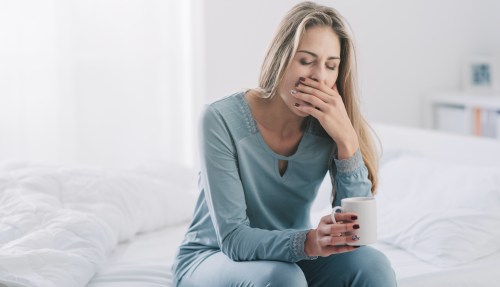3 Reasons Why Your Coffee Habit Is Actually Making You More Tired
Two doctors explain three reasons why coffee makes you tired sometimes, instead of energized. Plus, what to do about it.

One of the main reasons why millions of people drink coffee every day is because of its energy-boosting properties. Having trouble getting out of bed in the morning? Don’t worry, coffee will help you move through your morning routine. Feel your eyelids falling during a long Zoom meeting? A cup of coffee will jolt you awake.
Experts in This Article
Rob van Dam, MD, is an adjunct professor of nutrition and epidemiology at Harvard T.H. Chan School of Public Health. He conducts research into the role of diet in the development of obesity, type 2 diabetes, and cardiovascular diseases with a particular interest in Asian diets.
Ronald Chervin, MD, is a professor of neurology and sleep medicine at the University of Michigan. He leads the Division of Sleep Medicine at Michigan Medicine. Dr. Chervin completed his medical degree at Stanford University, and a master’s degree in clinical research at the University of Michigan School of Public Health. He completed a residency in neurology at Cornell University in New York City, and a fellowship in sleep medicine at Stanford University.
The fact that coffee is so intricately linked to boosting energy is exactly why it can be downright dumbfounding when you find yourself needing a nap soon after having finished your brew. What gives, right? According to doctors, there are actually a few reasons why coffee makes you tired sometimes. Here, two experts explain exactly why this can happen and what to do about it.
Why coffee makes you tired, according to doctors:
1. You’ve built up a high tolerance.
According to nutrition and epidemiology expert Rob van Dam, MD, if coffee used to do a clutch job at keeping you energized but now it just isn’t doing the trick, it could be because you’ve built up a high tolerance. “People develop some tolerance to caffeine when they regularly consume it. That means that over time the same amount of caffeine will tend to have less effect,” he says.
Ronald Chervin, MD, a professor of neurology and sleep medicine at the University of Michigan, agrees. “If you’re having caffeine once or twice a week, you aren’t going to build up a tolerance, but if you have coffee—or coffee and then other sources of caffeine—every day, you do build up a high tolerance,” he says. This is why, Dr. Chervin says, people who drink coffee every day often get headaches when they give it up; it’s a sign of caffeine withdrawal.
If you feel you’ve developed a caffeine dependency, something that can help is integrating non-caffeinated drinks into your day in place of when you would have your coffee. This can include decaf coffee, golden milk, or herbal tea. If you’re used to having a few cups of coffee a day, replacing one of those cups with an alternative is a great place to start.
2. You’re using it as a substitute for sleep.
As a sleep doctor, Dr. Chervin says one problem he sees with coffee is that many people are relying on it to power their day when in reality, they need more sleep. “You have to think about who may be turning to coffee in the first place, and that’s likely people who are already tired,” he says. “Coffee is often used as a substitute for sleep, consumed when you go to bed later or wake up earlier than you would without coffee,” Dr. van Dam says.
Take it from a sleep doc, there’s no substitute for sleep—including coffee. “If you’re using coffee to cover up the fact that you’re sleep-deprived, you’re still going to be tired,” Dr. Chervin says. Think you could fall into this bucket? Dr. Chervin’s advice is that instead of brewing yourself a cup of coffee in the afternoon, what will actually be more energizing is taking a nap. “Fifteen- to 20-minute naps can actually do wonders for some people,” he says, adding that naps that are longer than this could make you feel drowsy. And bonus, you won’t have any caffeine in your system when you’re heading to bed later.
3. You’re drinking your coffee too late in the day.
Speaking of still having caffeine in your system when you hit the hay, this brings us to the third reason why Dr. Chervin and Dr. van Dam say coffee can make you tired. “People may have difficulty falling asleep if they drink coffee too late in the day,” Dr. van Dam says. That means when you wake up tired the next day, the culprit is that late afternoon cup of coffee.
If this is true, you may be wondering why some people can have an espresso with dinner and fall asleep later no problem. This is because different people metabolize caffeine at different speeds; if you metabolize caffeine quickly, it won’t affect your sleep as much as someone who metabolizes it slowly. But if you’re having trouble sleeping, you’ll be hard up to find a sleep doctor who will sign off on an afternoon or evening cup of joe.
Here’s the bottom line: Coffee can be a helpful way to boost energy when used once in a while. But if you become too dependent on it, it will lose its effectiveness and actually backfire, making you tired. And it certainly can’t replace the need for sleep. There’s no drink or drug in the world that can replace that.
Oh hi! You look like someone who loves free workouts, discounts for cutting-edge wellness brands, and exclusive Well+Good content. Sign up for Well+, our online community of wellness insiders, and unlock your rewards instantly.
Sign Up for Our Daily Newsletter
Get all the latest in wellness, trends, food, fitness, beauty, and more delivered right to your inbox.
Got it, you've been added to our email list.










